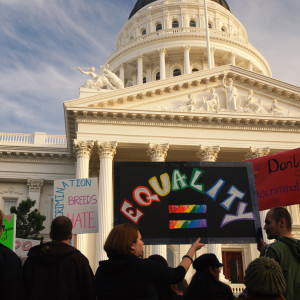The Supreme Court will soon decide whether state restrictions of marriage to opposite-sex couples can stand under the 14th Amendment to the U.S. Constitution. Thirty-four states have approved constitutional amendments or statutes codifying that common-law restriction.
If the Court holds that the traditional definition of marriage is unconstitutional, it will have nationalized marriage—one of many matters the 10th Amendment leaves to the people and the states. That amendment avers that powers not delegated to the federal government by the Constitution, nor prohibited by it, “are reserved to the States respectively, or to the people.” The sanctioning of marriage is one of those powers.
The ruling sought by the petitioners in Obergefell v. Hodges would change that. Although a union between a man and woman has been the common-law definition of marriage from colonial times, the petitioners argued that the traditional legal definition is “irrational” and that prohibitions against same-sex marriage are inexplicable by anything but animus. The petitioners also found it irrelevant that large majorities at the ballot box and in the legislatures of 34 states supported the age-old definition. A decision in favor of the petitioners would deny the people the right to decide a matter that throughout U.S. history has been considered beyond federal authority.
The state of Ohio and the other respondents contended that the traditional definition of marriage is rational and should be upheld. They linked the right to marry with potential procreative activity, explaining that society has chosen to channel such activity into a stable social and legal relationship: marriage. The lawyers for James Obergefell brushed aside such concerns and made the broad claim that gender roles are anachronistic. Of course, if gender is not a reasonable criterion for marriage, one must wonder what is?
Court watchers are fairly confident that Justice Anthony M. Kennedy will be the key vote in this case. Justice Kennedy started us down this slippery slope in Lawrence v. Texas (2003), when he authored an opinion in which the Court overruled precedent and held that Judeo-Christian “ethical and moral principles” may not form the basis of legislation. To prevail, Obergefell will need Kennedy’s vote.
During oral argument Kennedy expressed great concern that the Court was being asked to strike down the traditional definition of marriage that “has been with us for millennia.” In light of this history, Kennedy said it should be “very difficult for the Court to say, oh well, we know better.” But toward the end of the argument he seemed to warm to the petitioners’ position.
This case comes down to the one question: Who is to decide? Right now our federal system allows the people of the states to make decisions about marriage laws. Eleven states allow same-sex marriage; more than three times as many have affirmed the traditional definition. The debate on this issue continues across the Union.
The Court should be careful in prematurely cutting off the discussion and foisting a uniform definition of marriage on the country. The Court made similar a mistake in Roe v. Wade (1973), when in the midst of a vigorous national debate it ruled unconstitutional a state law that banned abortions except to save the life of the mother. The Court further concocted a trimester system in which the states were prohibited from regulating any abortion procedure performed during the first trimester of pregnancy, could only pass limited regulations related to maternal health in the second and third trimesters, and could enact statutes protecting the life of the baby only in the third trimester.
This one-size-fits-all, extra-constitutional solution only served to radicalize the opposing camps, creating great acrimony that bubbles up every election cycle. Inasmuch as reasonable people can have differing views on abortion, the Court should have permitted the public debate to continue rather than attempting to settle the matter via constitutional law.
If the Court legislates from the bench and holds it unconstitutional to define marriage as a covenant between a man and a woman, we can expect a similar outcome. Respectful debate over an issue on which reasonable people have policy disagreements will be a thing of the past. Each side will demonize the other and acerbity will replace the dignified (though at times fervent) debate on the proper definition of marriage.
Let’s hope the Court has learned from its mistakes and leaves this matter to the people of the states.

